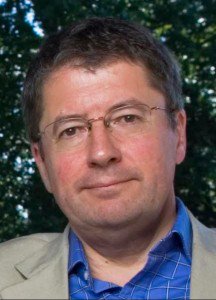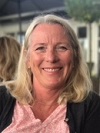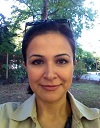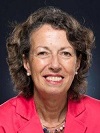Workshop Threatened Researchers I: Threatened Researchers Workshop 2017
Im Gespräch mit gefährdeten Wissenschaftlern
Was müssen Einrichtungen wie das KIT und seine Wissenschaftlerinnen und Wissenschaftler tun, um gefährdete Kolleginnen und Kollegen zu integrieren? Welche Unterstützung brauchen sie, wo liegen die Chancen? Darum drehte sich ein Workshop Mitte Dezember, den das KIT mit Unterstützung der Humboldt-Stiftung gemeinsam mit der Deutschen Gesellschaft der Humboldtianer und deren Regionalgruppe Karlsruhe-Pforzheim veranstaltete.
Vertreterinnen und Vertreter der Netzwerke Council for at Risk Academics (Cara) und Scholars at Risk (SAR) diskutierten mit Forschenden, die aus einer bedrohlichen Lage unter anderem ans KIT gekommen sind und ihren wissenschaftlichen Weg weitergehen wollen, und ihren Gastgebern.Gemeinsam loteten sie Wege der Zusammenarbeit und Unterstützung auf unterschiedlichen Ebenen aus, exilierte Forschende in die hiesige Wissenschaftsgemeinschaft aufzunehmen, und welche Vermittlerrolle nicht betroffene Kollegen und Netzwerke dabei übernehmen können.
Professorin Caroline Robertson-von Trotha vom Zentrum für Angewandte Kulturwissenschaft und Studium Generale (ZAK) am KIT moderierte eine Diskussionsrunde zu Herausforderungen und Chancen für Wissenschaftlerinnen und Wissenschaftler, die aus Krisenregionen nach Deutschland kommen. Meri Uhlig, Integrationsbeauftragte der Stadt Karlsruhe, hielt es für wichtig, dass eine Stadt wie Karlsruhe aus dem Bewusstsein ihrer Stärke und Attraktivität heraus eine Haltung der Offenheit und des Willkommens geflüchteten Menschen gegenüber zeigt. Stephen Wordsworth, Executive Director von Cara, und Karen-Lise Scheie Knudsen von der SAR-Sektion in Norwegen, sprachen darüber, wie Netzwerke und Hochschulen bei der Integration gefährdeter Wissenschaftlerinnen und Wissenschaftler zusammenarbeiten und wie diese finanziert werden kann. Professorin Rahel Schomaker von der Fachhochschule Kärnten ging auf den europäischen Kontext ein, Dr. Petra Roth vom International Scholars and Welcome Office am KIT auf die Unterstützung, die Forscherinnen und Forscher benötigen, um sich eine neue Perspektive aufzubauen.
Im Lauf des Workshops entwickelten die mehr als 30 Teilnehmerinnen und Teilnehmer Kurzbotschaften in englischer Sprache, die sie über soziale Medien streuen wollen, um so eine breite Öffentlichkeit über die Situation gefährdeter Wissenschaftler zu informieren. Zum Beispiel: „Das Kümmern um gefährdete Wissenschaftler braucht institutionelle Unterstützung, um nachhaltig und effektiv zu sein.“ Das bieten etwa die mittlerweile drei Philipp Schwartz-Stipendien, mit denen das KIT gefährdete Wissenschaftler in die Lage versetzt, zwei Jahre zu forschen und neue Perspektiven in der Wissenschaft zu entwickeln. Andere Kurzbotschaften betonen, wie Integration akademische Institutionen bereichert: “Gefährdete Wissenschaftler zu unterstützen, fördert die Freiheit der Forschung und des Teilens von Ideen.“ Oder sie zielen auf soziale Aspekte der Integration: “Je mehr wir gefährdeten Wissenschaftlern und ihren Familien helfen, sich in Karlsruhe zu Hause zu fühlen, umso besser integrieren wir sie als Individuen und Forscher.“
Panel Discussion Speakers
 |
Stephen Wordsworth, Executive Director of CARA, born in 1955 in Port Talbot, South Wales, former British diplomat, now Executive Director of the Council for Assisting Refugee Academics (CARA). Educated at St John’s School Porthcawl, Epsom College and Downing College Cambridge, where he studied German and Russian (MA). Wordsworth joined the Foreign and Commonwealth Office (FCO) in 1977. In London, he held a range of posts in the FCO and Cabinet Office, including as FCO Section Head for relations with East Germany and Berlin as the Berlin Wall came down. In 1992 he was honoured by Her Majesty the Queen with the award of Lieutenant of the Royal Victorian Order for his part in the organisation of her State Visit that year to Germany. After leaving the FCO, Wordsworth joined the Council for Assisting Refugee Academics (CARA) as Executive Director in 2012. Wordsworth was a member of the first cohort to take the Financial Times Non-Executive Director Certificate course, graduating in 2012. He is also a member of the British-Serbian Chamber of Commerce and of North chapel Parish Council in West Sussex. |
 |
Karen-Lise Scheie Knudsen from the University of Adger and Head of Scholars at Risk, Norway Section. Faced with the difficult circumstances of an Iranian activist and scholar of political science who is facing threats due to his writing and activist affiliations and has been arrested and kept in solitary confinement for four months, Karen-Lise Knudsen, worked with speed and grace to safely provide the scholar with sanctuary in Norway. The scholar even lost his university position while in prison. Understanding the urgency of the scholar’s case, Karen took it upon herself to get the scholar’s residence permit as quickly as possible by assuming power of attorney and submitting all the documents herself. All the while, the University of Agder worked closely with Karen and SAR to ensure the scholar’s swift escape to safety. Thanks to Karen’s hard work and dedication, the scholar received a visa and made the journey from Iran to Norway. |
 |
Neda Soltani, Representative Scholars Rescue Fund (SRF), exiled researcher at Berlin Graduate School Muslim Cultures and Societies, born 1977 in Isfahan, Neda Soltani is an Iranian exile. During the 2009 Iranian election protests, she was teaching English at Azad University when her Facebook profile photo was mistakenly published in many articles about the death of the similarly-named Neda Agha-Soltani, who was shot and killed during the protests. She tried in vain to remove her photo from the Internet and the media. Claims and counter-claims were made, including claims from the Iranian government that she was the same person as Agha-Soltani, and had faked her own death, and others who claimed that she was herself an agent of the Iranian government, impersonating Agha-Soltani to sully her memory. Within two weeks, she had to flee from Iran to avoid arrest. She was granted asylum in Germany in 2010. As of 2012, Soltani remains exiled from Iran, and is under Germany's asylum. She has authored a book, My Stolen Face, narrating her story of the incident. |
 |
Social scientist Meri Uhlig was born in 1973 in Karlsruhe and is currently the Integration Officer of the City. After working for the Integration Officer of the city of Mannheim she worked for many years for the state government of Baden-Württemberg in the field of integration - initially in the Ministry of Justice and then in the Ministry of Integration. Since 2013 she is the Integration Officer of the City of Karlsruhe. Meri Uhlig is married and has two children. Creating social diversity and strengthening social cohesion are two sides of the same coin. For Meri Uhlig these two tasks are the core of her profession. It is important that people, irrespective of their origin or economic power, are part of society and find opportunities to actively participate. This also means that people are aware that they shape society and then actively appear. For Meri Uhlig, integration is the interplay of ability, willingness and permission. |
 |
Prof. Dr. Caroline Y. Robertson‐von Trotha was born in Glasgow/Scotland in 1951. She is founding member and director of the ZAK | Centre for Cultural and General Studies at the Karlsruhe Institute of Technology (KIT). After her studies in sociology, philosophy, and history in Heidelberg and Karlsruhe she finalized her doctoral dissertation in sociology and habilitated at the University of Karlsruhe (now Karlsruhe Institute of Technology, KIT) in 2004. Her research focuses on cultural change and globalisation, internationalisation, multiculturalism, as well as theory and practice of public science. She is coordinator of the German network of the Anna Lindh Foundation, member of the Culture Committee of the German UNESCO Commission, and chairwoman of the Academic Council for Culture and Foreign Policy (WIKA) at the Institute for Foreign Cultural Relations (ifa). |
 |
Prof. Dr. Rahel Schomaker, Carinthia University of Applied Sciences, Professor for Economics and Senior Researcher at German Research Institute for Public Administration. As an economist with an additional degree in Political Science and Middle Eastern Studies, Rahel M. Schomaker obtained her PhD in 2009 at Muenster University, her venia legendi in 2012 at the German University of Administrative Sciences. Much of her academic work is dedicated to issues the Middle East. Her research is focused on institutions and their relevance for development and growth, not only on the macro-level, but also the micro-level, as well as on security issues and research related to transition processes in the public administration as well as the governance of migration. Additionally, she works with national and international institutions in consultancy projects. |
